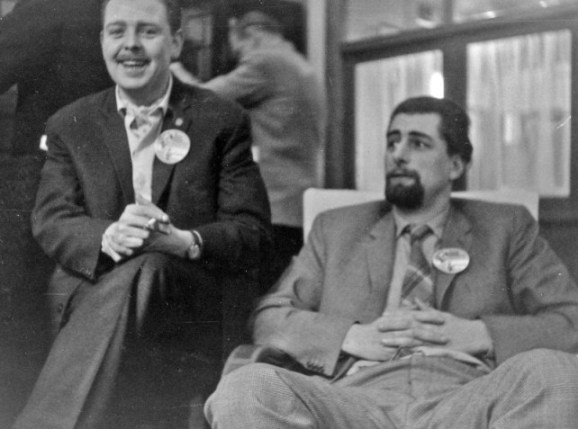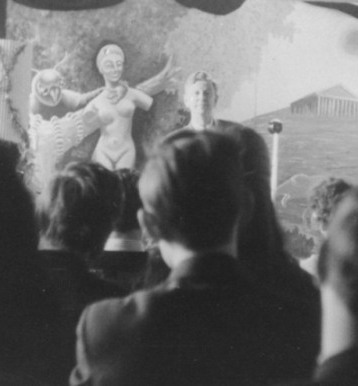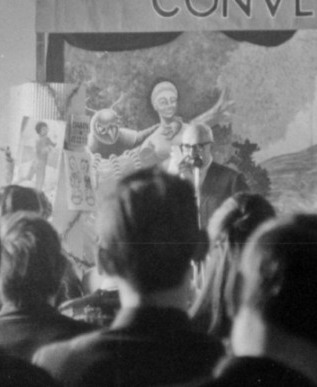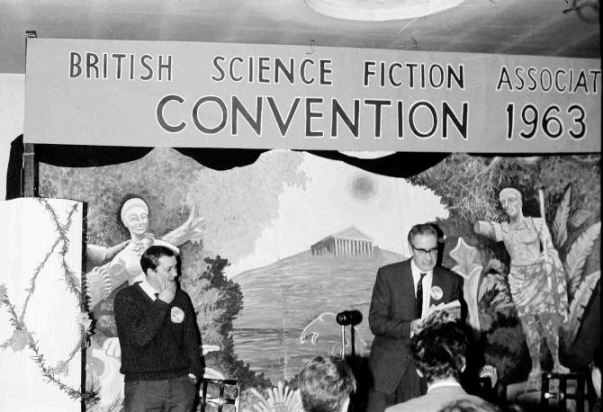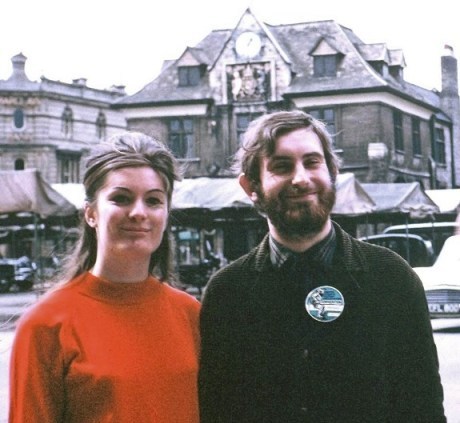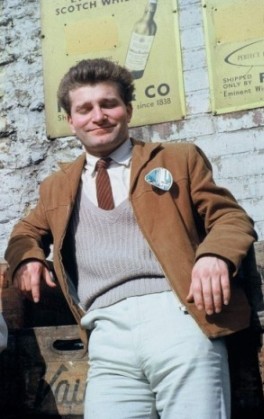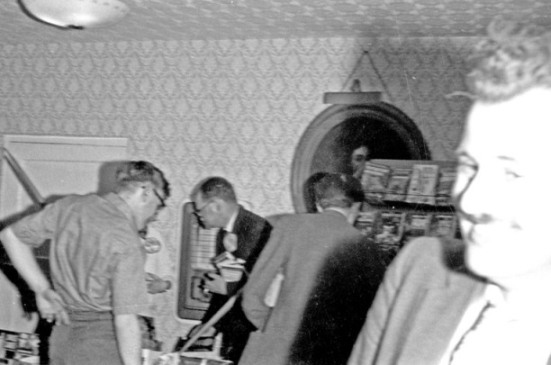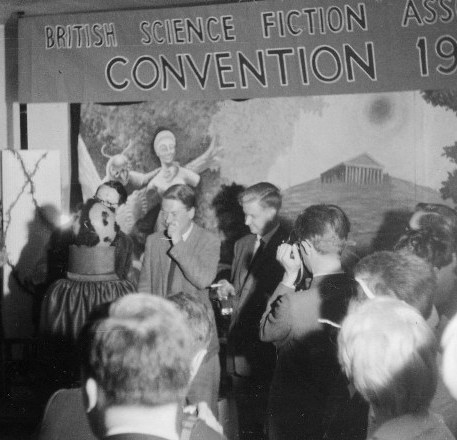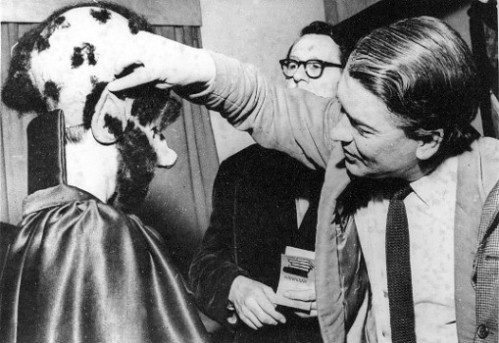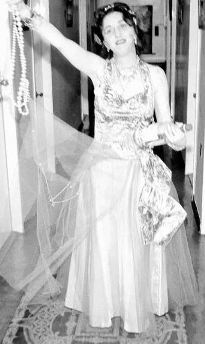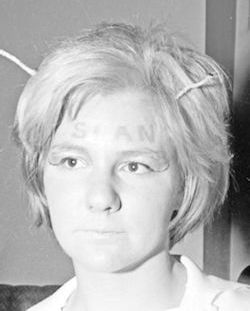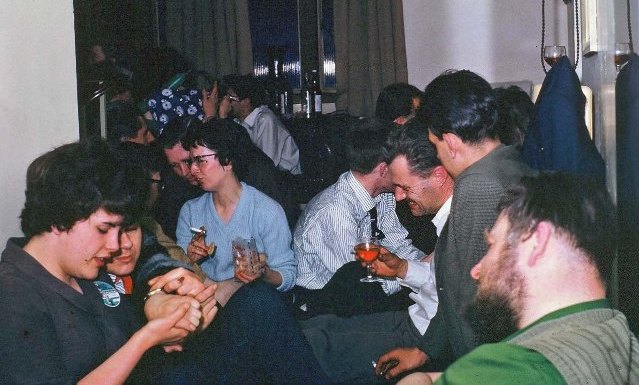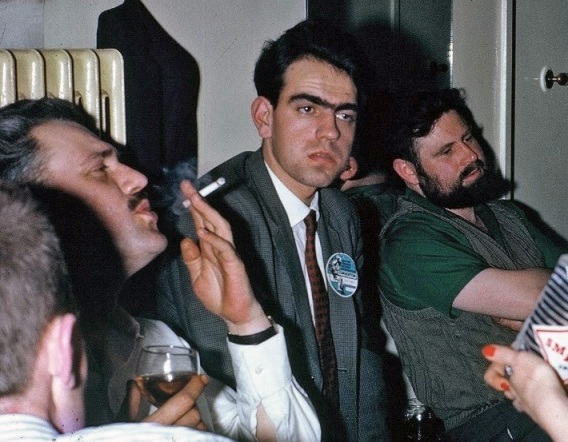Saturday April 13thBRIAN VARLEY:The Bull is, in some ways, an ideal Con-site. No interference by the management, no complaints from the resident Rip Van Winkle. Part modern, part archaic, We were unfortunately given a room in the old section, a large and dusty room hanging over the main road and traffic lights. At 5 a.m. that Saturday morning we were both shaken from a sound sleep, fought desperately to close an open window which, inevitably, had a broken sash-cord. Breakfast was taken quite early that morning, two shell-shocked wrecks seeking refuge, both immovably convinced that heavy transport MUST return to the railways.
RON BENNETT: The Saturday morning programme opened bright and early at ten with the address given by the Guest of Honour Edmund Crispin. Brian Aldiss introduced him briefly by saying that he was "incredibly handsome." Crispin remarked that he was attending as a member of the BSFA who had been lucky enough to do a few anthologies. After what he had seen the previous night one's life span is shortened if one is a practising member. He moved on to his talk - Science Fiction: Is It Significant? BRIAN VARLEY: Mr Montgomery gave a most interesting address in which he stressed the need to keep science-fiction separate from the mainstream of literature and proceeded to outline three possible dangers in it's Growing popularity. Firstly, he said, there was the danger of placing too much emphasis on depth of characterisation. The nature of sf is such that the individual is not so important; he is merely representative of his society and must, therefore, be to some extent a cardboard figure. Conversely, in "good literature" the deep characterisation of the individual is of prime importance. Secondly as the genre became more accepted it would become, and was becoming the happy hunting ground of mainstream authors who produced bad novels with hackneyed themes - in effect non-too-efficiently reinventing incandescent gas and gunpowder. He named no names at the time, but later, quoted "On The Beach" as a prime example. Thirdly, through the influence of television where there is little differentiation between merit and de-merit and through the association of the earth-satellite programmes it was becoming, in the public mind, a synonym for space-travel fiction. In actual fact only rarely was sf, concerned with space-travel as such, in the majority of cases space ships occupied the same position as the transatlantic liner or the railways in mainstream literature. He then changed to a more optimistic note when he maintained that modern sf was wholly worthwhile and getting more so all the time. It was coming-of-age in a big way, many more novels were being produced than in earlier days and novel-length plots were not so frequently being cramped into novelettes and short stories. The flowering of the hard-cover novel was a good thing, especially as they were being published under more diverse and better range imprints, thus making then acceptable to a wider audience. RON BENNETT: He concluded by saying that S.F. writers are generally underpaid, to which remark Harry Harrison shouted "Hear hear!" Many S.F. writers use novel length ideas for short stories, said Crispin, and noted that thanks to Ken Slater there were 60 titles he could not mention, either favourably or unfavourably, a reference to the Convention's novel competition. In answer to questions Mr Crispin said that he had chosen his pen name from "Crispin" meaning curly haired and "Rufus" meaning red. He did not like "Rufus" so substituted "Edmund" from King Lear. He was once asked to write a SF story and he had sent it to F&SF but it had been rejected with "a long, cautious and courteous letter." He said that because of main stream writers entering the field the name of SF was becoming debased in the eyes of the general reading public. He deplored the success of that which is bad and also the state of affairs which allows the bad to be successful. BRIAN ALDISS: Bruce finished by saying that he considered sf to be the major literary revolution since Marlowe, Shakespeare, and the Elizabethan dramatists. Even those who had never read one of Marlowe's mighty lines clapped very loudly at this. In the discussion which followed, Tom Boardman said he thought sf should avoid too much clarification; its chief duty was to draw strangeness. John Roles said that fanzines contained a great amount of exegetical literature, and Aldiss wrote the word down in his notebook. Taking up one of the points Bruce had made, Geoff Doherty said he thought that such novels as Karp's "One" and Golding's "Inheritors" represented examples of incursions into the field by outsiders who might be reckoned to have gingered it up. This was generally if reluctantly agreed. The Danish gentleman, Mr. Harry Harrison, was the next distraction on the programme. He spoke on two subjects dear to the heart of the assembled multitude, Sex and Science Fiction.
BRIAN VARLEY: It is extremely difficult to do a fair report of Harry's speech, for despite the gag-a-minute approach it was obvious that he was dealing with a subject close to his heart. He started out by handing a large quantity of leaflets out, which on examination proved to advertise the Esperanto system and whilst these were being fought over pinned up his three exhibits. These were, a large-sized nude (large in every way) a copy of an cartoon depicting two children seated on their pots, and an American pb entitled "Damn It!" His main theme was the peculiar world of pulp publishers. Covers strongly suggested rape, captions promising vicarious thrills, yet inside the writing censored to a degree of unnatural purity. Pointing at Exhibit A, the nude, he announced that this was culled from a magazine which had deleted the word "breast" from one of the stories. Sf writers had been conditioned to this pulp attitude to sex; evidence Heinlein's "Stranger In A Strange Land" which was supposed to herald the new 'liberal' Heinlein, untrammelled, modern and without taboos. Whilst the story implied such things as free-love, and group copulation (in one great rotting heap, I think his words were) in actual fact the nearest the book approached to a direct description of sex was in the phrase "Their lips met". Harry was explaining how, in DEATHWORLD, after the hero had suffered mightily for more than 200 pages he had felt it reasonable that he might put into the hero's mouth the word 'Damn'. This was excluded by Analog from the published version. It was during this part of the speech that Ted Carnell rather astonished this naive member of the audience by admitting that if a word or phrase offended him personally, then it was deleted. Ted, for example, dislikes 'Bastard' and, as Harry said, there are many more prurient minds than Ted's in editing. This certainly touched off a response in me, for I prefer not to have my reading expurgated, having a reasonable desire to know in the author's own words what point he is making. By all means exterminate the filth for filth's sake, but let the magazines grow up by removing their suggestive covers and, at the same time, printing fiction written with an adult audience in mind, and uncastrated. Kama Sutra anyone? BRIAN ALDISS: He ended a very stimulating speech, which was illustrated by a number of exhibits, by saying that he thought censorship was just an editorial bad habit as far as the sf editors were concerned. When it had been pointed out to them often enough, sense should prevail. In fact, he said, "this small animal of censorship" can be killed by exposure. Indecent exposure, no doubt. In the discussion which followed, John Brunner rose to defend Philip Jose Farmer's writings and Sturgeon's 'Some of Her Blood" on the grounds that these at least got away from gadgetry. Chris Miller replied that they were merely psychological and sexual gadgetry; it struck me at the time and now that I'm sober as a good point. Editor Ted Carnell rose to say that there was a rising tide of sex, and that twenty percent of the stories he received in SS were full of sick sex. Some uncouth knave from the back of the hall urged him to publish them instead of what he does publish. After a brief fight for Harry's exhibits, the meeting broke up, and drinking and fraternisation took place. By now it was apparent that the Convention fairly bulged with life. There were more pretty wives and girl friends in evidence than ever before, not to mention a host of jolly and pattable children; the whole affair was like a big family gathering, and made me feel more than ever that fandom is a lay of wife. At this stage we were about to depart for lunch. We had the glasses in our hands, when we had to face a reporter from the Sunday Telegraph. Miss Heather Nicholson was certainly easy to face, but she soaked up our comments with the sponge-like facility of a block of graphite. Bruce, John Brunner, Geoff Doherty and I, not to mention a maverick Oxford scientist called Denys Leston, talked to her for three hours about sf. Need I add that she got her own back? Not a word appeared in the paper! BRIAN VARLEY: A second auction session followed, ending the morning programme and we wended our way out for lunch. We decided, for once, to give the Great Wall a miss and instead went next door to the Wimpy bar. In the thirty minutes it took to provide us with our Hamburgers, the debate on the Harrison talk flourished. The main protagonists were Ella Parker and Bobbie Gray with occasional encouragement from Ethel, Frances, Ken Cheslin, and I. Many of the expurgateable words were given an airing. I can well appreciate Ella's objections to censorship, if you carry it to the logical conclusion she might as well cut her tongue out. The afternoon's proceedings started with the third and final auction, this time presided over by the master salesman, Ted Tubb. It is useless to try and report a Tubb auction, indeed dangerous. A good quote may well cost you five bob with a copy of New Worlds thrown in if Ted catches you. Anyone who has seen Ted in action needs no report from me, anyone who hasn't should make it a number one priority - but come along prepared to pay for the pleasure. Without any doubt, one of the highspots of the con. LANGDON JONES: Max Jakubowski, Jim Groves and myself went out to the Mayflower/fair?/fly? which seemed to be full of fans, then wandered back to the 'Bull'. I had been warned by someone that if I recorded nothing else in my life again, to record Ted Tubb conducting the auction. So I got back from the May-thing with plenty of time to spare. However when I took my taper to the hall, it was full of people in fancy-dress and reporters. Quietly cursing the daily press I put my taper away, I wish I hadn't. It is useless trying to describe the thing, if you have ever seen Ted Tubb conducting an auction you will know what I mean. The highlight of this auction was when Ted was trying to convince us that the handful of crud he was selling was good radiation protection, "A few shillings will buy four inches of safety for the wife and kids" he said earnestly…
BRIAN VARLEY: After half an hour or so Ted's place was taken by Ken Slater, a sad anti-climax. Nobody, but nobody, should follow Tubb in this game. We sat in embarrassed silence whilst Jeeves's "Soggy" illos were auctioned off at a tanner apiece. Even worse was the sale of the original typescripts of the Aldiss novels HOTHOUSE and NONSTOP. One was sold at the ridiculous reserve price of £1 to Jimmy Groves and the other, for which no offer at all was made, was later disposed of privately to Mike Rosenblum. The price that these would have raised on the American market make this a farce, a £100 might easily have been obtained. I feel strongly that any future acquisitions of this type should not be restricted to sale at the Con, but should be offered to the American market as well. The effective sale of these two manuscripts alone could and should turn a moderate loss into a good profit. The afternoon, according to the programme, was given over to an 'Open House' where the people of Peterboro' were invited in to meet fandom. The populace streamed uncaring past the Bull and fandom, left to its own devices, talked, read, drank tea, and even wandered out to inspect the town. The most unsuccessful part of the programme, and one that does not require a repeat.
BRIAN ALDISS: At last I dragged a starving Margaret off to eat. She had spent a while shopping with Joan Harrison and children, and had a good appetite. With Geoff, we took a well-bread snack in the hotel buttery, before slipping out to do some window-gazing. I should have known there was trouble afoot - she lured me into a shoe shop and I bought her a pair of shoes. We also had a quick look at the cathedral. There were a number of citizens of the Soke looking disgustedly at a notice two hundred feet up the fine west front that said GOD FOR TAFF. During that afternoon, I managed to get around and chat with a lot of people, though I missed an auction at which I hear Ted Tubb excelled himself; apparently he also ex-selled a number of books. In particular I had a long serious talk with Mike Moorcock and Denys. Mike circumnambulates about his points, but they are generally ones it is worth walking around; we had a big chat about Ballard, Mike claiming that Ballard's limitations were his strength, I that they were his weakness. Mike almost has me convinced. ARCHIE MERCER On Saturday evening, Peter Hammerton of the Lincoln Astronomical Society gave a slideshow-talk on the planets, and the conditions that we may expect to find when we reach them. This was received particularly well by the younger attendees, and the question-and-answer session which followed went on so long that the item was never formally brought to a close at all, and if Peter's two assistants hadn't started packing up the equipment it might still be going on yet. The trio wasn't able to stay for very long afterwards, and are to be thanked for making the journey for the occasion. BRIAN ALDISS: How difficult it is to recapture on paper the essence of these events when they have passed into history. A straight run through of events and gags by no means catches that big sweet fleeting dumpling of a thing that is the true Con flavour. Myself, I think it's the friendliness of the whole event, that particular friendliness which stems from the fact that you are with people who, in the main, are at once buddies and strangers. Added to this is the feeling nowadays that British sf is getting somewhere; and Geoff Doherty, who missed last year's Con, claims that the people grow more sophisticated and polished each year. It may be so, though the civilized milieu of the Bull certainly helped this year. But enough of this philosophising, for I see by my notes that by now time was getting on and the frailer of the brethren were suffering from pangs of hunger. In fact, the weaker went to the wall - the Great Wall - and I with them. Our party consisted of the four Harrisons (who act like six, although Joan and the children are so well-behaved), the Brunners and their immense black dog, the Moorcocks, Margaret and I, Mack Reynolds, and friends of his from Paris, the Yarboroughs. Bill Yarborough is a nice guy, a true fan (have I spelt that right?) and very generous with litres of bourbon. It was under the influence of his drink that we coined all our bourbon mots. That I remember as a very complicated meal, not only because most of the men insisted on drinking more than one macaulay (that's what fandom calls the mundane lager), or because Harry was ordering up in Spanish, but because we were being interfered with from the next table, where sat Brian and Frances Varley, who are still on the lam after organising the SUPERMANCON in '54. Well they were still on the lam, waiting for the mint sauce, when we left the Wall, which will tell you what the service was like there: a church service. The meal broke up with the arrival of Kingsley Amis, who had driven over from Cambridge with a friend of his, Bill Rysinker or such a name - an American of infinite jest. Back at the Bull, other notables had checked in, including Dan Morgan, whose name was once very well-known in Authentic and New Worlds. He still takes a keen interest in sf, and looks as spry as when I last saw him, back at the London World Con in '57. Also arrived, Yorkshire author Brian Ball, who also seems to be in on the school sf anthology racket. Later, Eric Bentcliffe, who publishes - as old fans will recall - BASTION, appeared with his wife, Beryl. His flash equipment looked larger than ever; later, in the fancy dress parade, he and Eric Jones were having an absolute duel, with bulbs going nova every second. Bruce and I took Kingsley to see Ken Slater's tremendous book display. It was a great collection, and seemed to be selling well. The three of us were then hauled away to judge the fancy dress, while the local press squeaked and gibbered about us.
RON BENNETT: A four piece band and T.V. cameramen were in attendance on the Saturday evening for the Fancy Dress Party. The theme of the fancy dress this year was "After The End" and monsters were certainly in evidence. It was good to see the support given this venture by new convention attendees and Ted Tubb - hardly a newcomer, really, - caused quite a stir by rushing into the hall clothed in a costume made up sheets of manuscripts. Harry Nadler of Salford was adjudged "Best Monster of the Year" and another special prize went to cat girl Janet Shorrock, whilst Tony Walsh won first prize for his costume which was simplicity personified - a sandwich-board man toting the slogans "Prepare to Meet Your Beginning" and "The Beginning is At Hand."
BRIAN VARLEY: The evening was set aside for the Fancy Dress party. For a long time the hired band plugged away in an empty room and throughout the whole evening only one couple attempted to dance on the carpeted surface. All in all the band appear to have been pointless, a tape-recorded background would have been cheaper and better. As it was, those nearest the band, had to shout to make themselves heard above the din. Slowly however, the fancy dresses started to appear, Alan Rispin and Ken Cheslin being among the early arrivals, followed closely by Ethel attired in a torn evening gown, loaded with jewellery as a drunken looter "after the end". (Who was it said to me, "Isn't Ethel coming in fancy dress then?".) A sensation was caused by the arrival of the four Salford/Manchester lads, first time con attendees, Harry Nadler, Chas. Partington, Tony Edwards and Tom Holt in really excellent costumes. It occasioned a great rush of amateur photographers. There was no surprise when Harry Nadler won the prize as "Best Monster" and was subjected to great attention by Press and ITV cameramen. Pity was they all couldn't get an award. Ted Tubb, surprisingly, arrived in costume, but too late for the judging. He certainly deserved commendation for originality, a patriarchial beard a gown of tattered manuscripts and a selection of placards bewailing the lot of the poor author. It took me a few moments to realise that it was Ted inside the garb.
BRIAN ALDISS: We gave Harry Nadler the Best Monster prize, and Tony Walsh the Best Fancy Dress because we thought it had wit - he paraded solemnly as a sandwich man, with boards saying "Prepare to Meet Your Remaker" and "The Beginning is At Hand". Note: Skyrack has these slogans differently; one of us must be Ron. (Photos confirm that Aldiss was correct - Rob.) There was also a special award to dainty little Janet Shorrock as a cat girl. Ted Tubb, as a bearded and benaged author, would surely have won a prize had he rolled up on time. ARCHIE MERCER Music was provided by Don Cowlan's band, a quintet of local musicians. They put up a brave showing despite the fact that few people wanted to dance - or indeed, had room to (which must be a considerable discouragement to a musician who's trying to play dance music). Somewhere around midnight, however, when the crowds had thinned out somewhat, in walked Dan Morgan (the science fiction author), unpacked his guitar, walked up to the far end of the hall, sat down beside the band and started to play. The difference was dramatic. Instead of playing pop music for dancing that nobody wanted to do, they were now playing for sheer enjoyment, and the result was an extremely enjoyable hour or so of mainstream jazz that I for one am most certainly glad I didn't miss - in a near-perfect atmosphere for that sort of thing. (Incidentally, coming from a traddie like me this is praise indeed).
BRIAN ALDISS: Frankly, much of the rest of that evening was hell. There was so much confusion. Down in the bars, the Salvation Army had broken in and were selling their magazine, War Hoon - in fact, Harry told them to bergeron off. Then upstairs we were hounded and dogged by the press. We took refuge in room five, the Black Hole of John Brunner, but they rooted us out. We all hid in my room, and were just settling down to a l'il drink when they came in and said could they film us if they did not interrupt. -We said okay, so they said right, let's have you in a bigger room. It was too bad: Kingsley was just talking about John Baxter's Guest Editorial in New Worlds. Eventually some BBC fellow flung the youngest Slater out of her bed and got Bruce, Kingsley and me into her room with a tape recorder. There he milked (with the aid of whisky) a marvellous quarter hour debate from us, three minutes of which were heard on the Midlands programme "Counterpoint' three days later. Once the vultures had gone, we began to enjoy ourselves. BRIAN VARLEY: Next stop was the party in 258 open-house held by Ella and Ethel. the start was rather delayed due to large numbers of people disappearing to watch TWTWTW (That Was The Week That Was) on the telly. When it did get going the party was a roaring success, too successful in fact. An astonishing number of bodies jammed themselves into the room and the scene gradually faded in a pall of smoke and steam. Every so often the seething mass swirled and in one of these Frances and I were erupted into the passageway where Aldiss and Harrison were in full cry, eventually disappearing down the fire-escape. This was, we discovered later, part of a deep laid plot which led to the Case of the Missing Pork Pies. Great rivalry had broken out between the Burgess Pie Marketing Board and the Aldiss Combine. Returning up the fire-escape the two anti-heroes had broken into the Burgess hideout and, discovering the stock of pies laid out on the bed, had secreted them in the wardrobe. This occasioned Brian no little discomfiture and his heavy tread and dirgeful voice were heard throughout the night as he searched for the missing provender. One up, indeed to Aldiss, but beware the wrath of Burgess in 64! Unaware of the high drama being enacted elsewhere we had entered a draw-poker school and again my better-half (better indeed!) was scraping it in whilst I was quietly losing our fare home.
ARCHIE MERCER: Ella and Ethel, of course, threw one of their open parties to which the attendees flocked fifty at a time. Whenever they saw a free square foot of floor space, Bruce Burn and Maxim Jakubowski squatted down and Russian-danced against each other until both fell over. Another time (still the same party) Eric Jones tried to hypnotise somebody - I forget who. He stood there behind him repeating over and over; "You are falling backwards ... falling backwards ... backwards". As I happened at the time to be sitting on a window ledge straight in front of a wide open window, I'm rather glad it didn't work out properly. LANGDON JONES: I was wandering about the hotel when Ella told me of the party in her room. I managed to get a few square inches of space on one of the beds and watched the crowds of people pouring in the door. At one time, in this small room, there were fifty-three people. A fellow called Burn did some sort of strange dance in the centre of the room, after a little space had been painfully cleared. Then there was an amazing demonstration of the powers of hypnotism that left us all laughing/gasping. I remember Brian Aldiss bursting in and firing a gun, shocking me out of the stupor I had been falling into. Finally everyone began to depart, so I said goodbye, and left. It was a fine party, thank you Ethel and Ella. By now the time was about four in the morning, and as I collapsed into the bed, I consoled myself with the thought that at least I would be able to get a breakfast next morning. (I awoke at 10.15, rather too late for breakfast.)
BRIAN ALDISS: To preserve some of the decorum of this report, I have postponed until now any account of the previous night's activities; but in the interests of truth I must here reveal that on that preceding night - Friday - Danish fan Harrison and I were chased dawn the corridors by a horde of pro-eating fans. These uncannybals were led by promising new sharp-toothed Manchester fan Charles Partington. To escape their clutches, Harry and I had to flee down a fire escape at a rate of three cents a minute. So we resolved to take Saturday night more cosily. We pressed into the notorious Room Five, and I managed to sell quite a few meat pies. (This transaction showed a considerable profit over last year's similar enterprise at Harrogate, although Brian Burgess was competing with me with a vast range of pies stuffed with pterodactyl meat; fortunately, I was able to enter his room and hide his stock in his wardrobe, thus stealing a munch on him.) Room Five was at its prime. The Brunner's double bed boasted as fine an array of knees as ever kissed nylon. They belonged to mesdames fans on, Harrison, Yarborough, Brunner and Boardman, and Mack Reynolds lay in the middle of them. With great devotion to duty, Harry and Tom Boardman brought out a subscription sheet to SF HORIZONS, the forth-coming review of sf, on Ken Slater's duplicator, and extorted several subs from the more gullible attendees. Time concertinaed down until you could get it all into a brown ale glass - they call it the XXX effect - and too soon it was 4.30. I crept to bed past Ron Bennett's brag party. He looked quite comfortable, sitting there in his braces. At 4.35, the sturdiest curate in the Soke of Peterborough started ringing reveille in the cathedral. That's a fine peal they have there, and from my room, 114, the belfry was visible as well as audible. Rousing the performance definitely was, and I wished the curate was a decampanologist.
| |||||||||||||||
|
